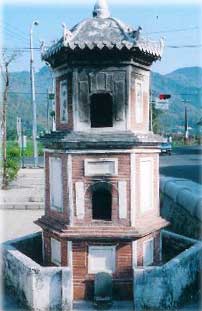
Meinong (美濃鎮), a township in Taiwan’s Gaoxiong County, holds a ceremony on the ninth day of each year according to the traditional luni-solar calendar to mark respect for the written word and ask the gods to bless the area, especially its farms. Meinong is traditionally a Hakka region.
In the ceremony, items such as old books that might normally be thrown away are instead burned in special structures known as jing zi ting (敬字亭 / [zūn]jìng [Hàn]zì tíng[zi] / “respect characters pavilions”), also known as xizi ting (xīzì tíng[zi] / “treat written paper with respect pavilions”). These structures, which are officially recognized as important cultural relics, date back to the latter half of the eighteenth century. The ashes are combined with the ashes of other written-word items burned over the previous year in the jing zi ting and, after various fanfare, ceremonially dumped in the local river.
This is related to the notion of jìngxī zìzhǐ (敬惜字紙/敬惜字纸 — “cherish paper with writing on it”).
This year, related activities included a contest to see which children would be the fastest to find certain characters in the dictionary. Such contests are not uncommon in Taiwan, where looking up something in a dictionary can be a real chore.
sources:
- Meinung township carries out ceremony to deposit ashes in stream, Taiwan Headlines translation of article from the United Daily News, February 7, 2006
- 高縣美濃鎮辦字紙祭小學生查字典比賽, CNA, February 7, 2006
- 敬字惜紙美濃廣善堂迎聖蹟, February 6, 2006
- photo of and information on a basic jing zi ting (in Mandarin)
- photo of and information on a relatively ornate jing zi ting built in 1779 (in Mandarin)
And here are some genizah (גניזה)-related links for lagniappe:
- Taylor-Schechter Genizah Research Unit at Cambridge University Library
- Princeton Geniza Project
